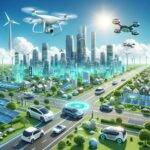
2024’s Most Disruptive Innovations — Dive into the world of tomorrow with our captivating exploration of the top ten disruptive concepts set to redefine 2024. From the wonders of AI personal assistants and quantum computing breakthroughs to the revolutionary shifts in autonomous vehicles and green energy, we delve deep into the innovations poised to transform our lives. Uncover how advancements in telemedicine, neural interfaces, and blockchain technology are reshaping industries, while 3D printing, VR/AR in education, and biotech breakthroughs promise a future filled with unimaginable possibilities. Stay ahead of the curve with our insightful look into the future’s most groundbreaking trends!
To better understand the impact of these exciting innovations in 2024, let’s take a look at this colorful graph that ranks each advancement on a scale from 1 to 10

Ranking the Impact of 2024’s Top Ten Innovations
Advanced AI Personal Assistants
Picture this: a world where each of us has a personal AI assistant, not just a gadget that sets reminders, but a sophisticated companion that understands our preferences, habits, and even our mood swings. These advanced AIs could manage our daily schedules, suggest meals based on our health goals, and even offer emotional support. They could learn from our interactions, adapting to provide more personalized and intuitive assistance. This technology might also revolutionize customer service and personal care industries, offering hyper-personalized experiences. The ethical and privacy implications would be significant, though. Questions about data security and the extent to which we rely on AI for personal decisions would become increasingly relevant. This shift could redefine human-machine interactions, blurring the lines between digital and personal spaces.
Quantum Computing Breakthroughs
Quantum computing, with its ability to process complex data at unimaginable speeds, stands at the brink of transforming numerous industries. Imagine computers that can solve problems in seconds, which would take traditional computers millennia. This leap could revolutionize fields like cryptography, making current encryption methods obsolete and driving the development of new, quantum-resistant cybersecurity measures. Pharmaceutical companies could use quantum computing to simulate complex molecular interactions, speeding up drug discovery and potentially leading to cures for diseases like cancer or Alzheimer’s. In finance, quantum algorithms could optimize portfolios and predict market trends with unprecedented precision. However, this power comes with challenges. The race for quantum supremacy could intensify global tech competition, raising concerns about digital sovereignty and the balance of power in technology.
Autonomous Vehicle Expansion
The expansion of autonomous vehicles (AVs) is set to change the way we think about transportation. Imagine cities where traffic flows smoothly, with fewer accidents and reduced congestion, thanks to self-driving cars. These vehicles could offer greater mobility for the elderly and disabled, who might otherwise be unable to drive. Delivery and logistics companies could operate more efficiently, with drones and driverless trucks transporting goods around the clock. The impact on urban planning would be profound, potentially reducing the need for large parking areas and changing the way cities are designed. However, this transition raises important questions about job displacement in driving professions and the regulatory frameworks needed to ensure safety and public acceptance.
Green Energy Innovations
The next big leap in green energy could be just around the corner. Innovations like ultra-efficient solar cells, wind turbines that harness more energy, and breakthroughs in energy storage technology could significantly reduce our reliance on fossil fuels. Imagine cities powered by clean, renewable energy, drastically cutting down carbon emissions and combating climate change. These innovations could also make renewable energy more accessible and affordable, potentially transforming energy economics worldwide. However, the transition to green energy poses challenges, including the need for substantial investment in infrastructure and the impact on industries and communities reliant on traditional energy sources.
Telemedicine and Digital Health
Telemedicine could revolutionize healthcare by making it more accessible and efficient. Imagine being able to consult with your doctor via video call, receive diagnoses, and have prescriptions delivered to your door. Wearable health monitors could provide real-time data to healthcare providers, enabling proactive management of chronic conditions. Mental health services could become more accessible, with online therapy and support systems. This shift could alleviate the strain on traditional healthcare systems and extend quality care to remote and underserved areas. However, it also raises concerns about the digital divide and the quality of care, emphasizing the need for robust digital infrastructure and regulations to ensure patient privacy and data security.
Neural Interface Technologies
Neural interface technology, bridging the gap between the brain and computers, could unlock incredible possibilities. Imagine controlling devices with your thoughts, enhancing cognitive abilities, or restoring functions lost due to neurological diseases. This technology could revolutionize fields like medicine, education, and entertainment. For instance, individuals with paralysis could use neural interfaces to operate prosthetics, regaining independence. However, the ethical implications are profound. Issues of privacy, identity, and the potential for misuse need careful consideration, as well as the societal impact of enhancing human capabilities through technology.
Blockchain in Government Services
Blockchain’s potential extends far beyond cryptocurrencies. In government services, it could introduce unprecedented levels of transparency, efficiency, and security. Imagine a world where you can track how every tax dollar is spent, vote securely online, and have confidence in the integrity of public records. This could dramatically reduce corruption and bureaucracy, making government services more trustworthy and efficient. However, implementing blockchain on such a scale would require significant investment in technology and training, as well as careful consideration of privacy and regulatory issues.
3D Printing in Construction and Manufacturing
3D printing technology could disrupt traditional manufacturing and construction industries. Imagine buildings constructed with less waste and lower labor costs, or customized products printed on demand. This technology could revolutionize supply chains, enabling local production and reducing the environmental impact of shipping goods globally. However, this shift could also lead to job displacement in traditional manufacturing sectors and require new skills and training programs.
Virtual Reality (VR) and Augmented Reality (AR) in Education
VR and AR could transform the educational experience, making learning more interactive and engaging. Imagine history lessons where students can virtually visit ancient civilizations, or science classes where they can explore the human body in 3D. This technology could cater to different learning styles and make education more accessible, especially for those with learning disabilities. However, widespread adoption would require investment in technology and training for educators, as well as addressing concerns about screen time and the digital divide.
Biotechnology Advances
The field of biotechnology is on the cusp of revolutionary breakthroughs. Imagine personalized medicine tailored to your genetic makeup, or gene editing techniques like CRISPR being used to cure hereditary diseases. Agriculture could see a transformation with crops engineered to be more nutritious and resilient. However, these advances raise complex ethical questions, such as the implications of gene editing and the access to expensive personalized treatments, highlighting the need for robust ethical guidelines and equitable access to these technologies.
Looking Ahead
As we stand on the brink of 2024, the horizon is alight with transformative innovations that promise to reshape our world. These ten disruptive concepts, from AI and quantum computing to green energy and biotech breakthroughs, are more than just technological advancements; they are the harbingers of a new era. They challenge us to rethink our ways of living, working, and interacting with our environment. Embracing these changes requires adaptability, ethical consideration, and a commitment to leveraging technology for the greater good. The future is not just coming. It’s here, and it’s brimming with potential and opportunities for us all.
About Disruptive Concepts
https://www.disruptive-concepts.com/
Welcome to @Disruptive Concepts — your crystal ball into the future of technology. 🚀 Subscribe for new insight videos every Saturday!
Discover the Must-Have Kitchen Gadgets of 2024! From ZeroWater Filters to Glass Containers, Upgrade Your Home with Essential Tools for Safety and Sustainability. Click Here to Transform Your Kitchen Today!







